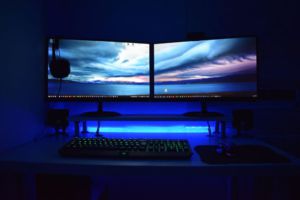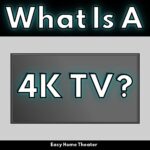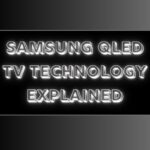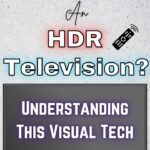8K TV Is Coming (A Surprising Visual Upgrade?)
8K TV Is Coming (A Surprising Visual Upgrade?)

I feel like TV technology is advancing at a rate that’s incredible honestly.
I mean think about it; just within the last 5 years even, we’ve seen the likes of 4K, High Dynamic Range, IMAX Enhanced and extended color go from publicly unknown, to essentially mainstream in the blink of an eye.
What’s more surprising is that these aren’t minor upgrades either; each one is a big advancement in their own right.
However when combined, together they provide for a visual experience that’s hard to describe.
Some of the best TVs in my opinion utilize these.
So with that, you might think industry leaders have pretty much done it all when it comes to display technology right?
Well…..not exactly.. because here’s the thing; 8K TV is coming.
8K Resolution Development Actually Started In 1995
The thought of expanding to 8k resolution actually started as early as 1995 by the company NHK.
It used to be called Super-Hi Vision while in development until the name was changed to NHK BS8K when they launched their 8K television channel in 2018.
For those of you unaware, NHK is a Japanese company that values innovation and advances in tech.
Due to this, they’ve been at the forefront of technology for quite some time now.
Be it 3D audio, high resolution cameras, etc, they were always one of the firsts to conceptualize it.
Even though work started in 1995, it wasn’t until 2005 where it was first demoed (which is still really early)
2007 was the year where things really started to materialize as it was finally standardized as an official video format by SMPTE (Society Of Motion Picture & Television Engineers) with the interface later being standardized in 2010.
Here’s a full timeline on 8K pertaining to TVs and other devices if curious.
https://en.wikipedia.org/wiki/8K_resolution#History
What Is An 8K TV?
So with all this talk of 8K, what exactly is it?
Well to put it simply, 8K is a resolution that consists of 7680 pixels horizontally, and 4320 pixels vertically.
With an 8K TV, it has 4 times the total pixels of current 4K TVs, and a whopping 16 times the resolution of HDTVs.
To give you an idea of how high of a resolution that is, you could hypothetically take an in 8K image, do a 2x zoom, and still have a 4K image.
It also commonly uses a 16:9 aspect ratio in content that’s shown on the display.
Why Is 8K Necessary?
If you haven’t witnessed 8K for yourself, it’s possible you might think of this high a resolution as a bit much.
While I certainly understand that perspective, there’s actually a surprising number of visual benefits where 8K could potentially benefit future living rooms/home theaters.
Reason #1: Pixels Become Invisible Even Close Up
One really big advantage to having a screen resolution this high is the individual pixels become indecipherable to the human eye — even when viewed close up.
Something to know about larger displays is that the larger you go, the blurrier an image gets at the same distance & resolution.
That’s because the same ratio of pixels get spread over a much wider area as you go up in size.
What 8K would allow for is bigger screens having a much higher pixel density.
This improves picture clarity and detail since there’s more pixels to better represent the nuanced details in the image.
Reason #2: Better Quality 1080P/4K
Another thing that you may not be aware of is that 8K could give a measurable clarity boost to current 1080p and 4K resolutions.
How?
Through 2 ways, either down upscaling or down sampling.
To put it simply, upscaling is where the display takes the original lower resolution image, and processes it to fit the 8K screen.
This can result in that image looking better than before.
Down sampling is a method where something is recorded at a higher resolution and then formatted to be played at a lower one.
By doing this, a lot of the original information of that higher resolution is kept.
As a result, the final image, along with other small details, are made much clearer than they would be otherwise at that same resolution.
By recording content at 8K, 4K (and even 1080p) movies would look better than they already do.
The best part about it is you wouldn’t even need an 8K screen to benefit since film directors/engineers would be the ones to record it and format for current displays.
https://www.techradar.com/news/8k-tv-everything-you-need-to-know-about-the-futuristic-resolution
Reason #3: True 4K Virtual Reality

A prior restraint on VR technology used to be there wasn’t a high enough resolution to give a 1 for 1 likeness with real life.
That’s because the pixel density would be divided between both eyes with the headset on.
This is how it creates that sense of full immersion.
The problem with that was the potential image quality appearing grainy due to the lack in resolution; which could lead to what’s known as the screen door effect.
Like the name suggests, it’s an occurrence that sometimes affects VR headsets where it feels like you’re looking at things through a screen door.
Even with a bump to 4K VR, (which surprisingly exists) it still has to be divided between both eyes.
With a massive jump to 8K, true 4k virtual reality would be made, (for lack of a better term) a reality since you would be getting the full 3840×2160 per eye.
This would not only help mitigate the screen door effect, but also make the experience feel that much more immersive as a whole because of that increase in clarity.
As an interesting sidenote that shows this isn’t too far away, the company Intel even streamed the 2020 Olympics (delayed until 2021) in 8K VR over 5G.
Whether 8K resolution VR becomes more commonplace remains to be seen, but it just goes to show that 8K isn’t as far off as one might think.
Reason #4: The Resolution Improvement For Photography & Video Editing Allow More Detail In Movies
Something interesting to note is that 8K cameras have been available for a few years now.
While they aren’t as mainstream as 4K cameras as of right now, they’re more common than one might think, as even recent smart phones have them.
A major benefit for photographers is that 8K offers more true to life images with more visible detail that might be lost at a lower resolution.
This is especially helpful for those not only interested in editing photos, but in video editing as well since the increase in resolution helps with accuracy & bringing out additional details in the frame.
Here’s an interesting article on that if you were interested in that aspect of it. https://nofilmschool.com/2018/02/beauty-8k-large-format
But this translates well for 8K tvs since movies shot with these cameras can showcase more detail due to there being more visual information in the source material.
Reason #5: More Realistic Content

Here’s something you may not have realized, humans can decipher image resolutions higher than 4K.
In fact, human vision has been said to be the equivalent of…(drum roll) 8K!
8K seems to be the upper echelon of what we can accurately distinguish; anything higher reaches a point of diminishing returns.
So with a resolution this high, content will finally be able to closely match our own visual acuity.
This would allow for content to feel even more immersive as it would closely mirror how we’d see things if we were actually there.
More on that here if curious.
https://onlinelibrary.wiley.com/doi/full/10.1002/msid.1072
Reason #6: Better Color Accuracy When Watching Content

The dramatic increase in resolution that 8K provides also has increased benefits for color accuracy as well.
Due to there being more pixels to represent a given image on screen, scenes in content can be more more lifelike due to there being more pixels to better display subtle changes in color and hue.
Think about it; instead of having 1 pixel to display the color blue for example, you now have 4 pixels for that same color as opposed to one.
This allows for much more subtly in color gradiation and helps to minimize banding even when compared with a 4K resolution; thus giving a more vibrant and believable image.
http://www.insightmedia.info/8k-tvs-top-tv-line-ups-for-a-reason/
When Will 8K Be Available?

Here’s the real question, when will it be available?! The answer to that is a little complicated since it technically is and isn’t available at the same time.
The reason I say that is because on one hand, there’s already companies like Dell and Nikon that sell 8K monitors & cameras available to the public right now.
Sony demoed their own 8K TV back in 2018, with Samsung also having their own commercial line of 8K televisions that year sporting their QLED technology.
https://www.pocket-lint.com/tv/reviews/samsung/145989-samsung-8k-tv-review-q900-led-85in
Since then, LG & TCL have created their own televisions sporting that resolution.
Plus there’s even 8K projectors that’s exist.
The issue with all of that being said though, is that the mass switch from 1080p to 4k broadcasting hasn’t even happened yet (though that actually is in the works finally)
Until the switch to ATSC 3.0 is finalized (which is the name of the switch to 4K resolution cable) and they can then turn their attention to 8K, we won’t see it for quite a while.
The infrastructure has to be built for it, which will definitely take time to say the least.
Until that happens, it’s a far off concept but with a lot of promise.
Now the thing to keep in mind though, is that the availability of devices, and the availability of content are two completely different things.
If we’re talking about when you’ll be able to buy the first 8K TV or monitor, then you technically can right now since they’re available for purchase from quite a few makers now.
Even the Xbox Series X and Playstation 5 gaming consoles have 8K support which is pretty incredible; especially from a gamer perspective.
But if you’re wondering when 8K will go mainstream with a good amount of content, then my honest estimation is at the very least a decade.
Some think it could happen sooner than that, but with the amount of things that would need to be done for that to happen, I don’t see that as a high probability.
I’d love to be wrong though, because it’s an amazing idea.
But the fact remains that the networks in most places still haven’t fully switched to even 4K.
There is content 8K content available, but it’s not as abundant yet.
So as much as I want it to be a major format sooner due to what it has to offer, it’s more likely than not that it won’t happen for a good 10 or so years in my opinion.
Final Thoughts
In any case, while it may not be as soon as we’d like, I feel like it will eventually become the de-facto standard at some point in the distant future.
When this does happen, the world of media will be drastically different from how it is today.
But the real question is, will this be for the better or worse?
Like most things in life, only time will tell.
Just remember, even though it’s not popular now, without a doubt, 8K TV is coming.
About Me

Jay
Hey everyone it’s nice to meet you. I'm Jay, writer & founder of the site Easy Home Theater. I've been with this hobby of home entertainment for many years now. I decided to create this site to be a helpful resource, and share everything that I've learned from personal experience with you. I also happen to be a huge gamer, lover of all things tech related, and a major fitness buff (love weightlifting)
Contact: Contact Jay
Facebook: https://www.facebook.com/Easyhometheater/
X: https://x.com/easyhometheater
Pinterest: https://www.pinterest.com/easyhometheater/pins/
Instagram: https://www.instagram.com/easyhometheater/
Followit: https://follow.it/easy-home-theater
Bluesky: https://bsky.app/profile/easyhometheater.bsky.social
18 Comments so far:
-
-
Same here! Could you imagine football in 8K?? That’d be insanely awesome.
-
-
I don’t like to watch TV so I don’t know very much about all these 4k, 5k, 8k, 100k, LOL. All I know is I want to be a millionaire by 25.
Haha jokes aside, I do learn a lot from this post and I can see that 8K TV is going to revolutionize the industry. Thanks for this awesome post and really looking forward to all these technologies!
-
Haha you and me both, but no doubt we’ll get there. But yeah I agree 8K definitely is poised to do that since its benefits are very far reaching. No problem.
-
-
Great article! I am totally amazed how fast technology evolves. I remember the hype about HD. Everybody was just going crazy on getting a HD TV. But as you already said, the technology evolves too fast. Many people didn’t even switch to 4K. It is kind of said for the developers I think, because they are doing so much work and now they can’t really enjoy the success. At least not now. By the way, I like the history about 8K. Never thought that they started that early with it?! Keep up the good work.
All the Best
-
Yeah it truly is fascinating how fast it all happens. Yeah I do agree with you about the developers thing but I can’t see that changing anytime soon tbh. Even now, there’s some revolutionary tech that exists even now that hasn’t been revealed to the public yet that won’t come out for a good 15 years.
-
-
Holy smokes, I had no idea what an 8k TV was. I keep things pretty basic in our house, but for Christmas we bought my parents a Smart TV, and my mind was blown setting that thing up. I can’t imagine I will be ready for an 8k TV but happy and thankful to have this information to inform my decision when it’s time.
-
Lol yeah they can be pretty unuser friendly to be honest. But who knows, maybe they might make it easier by then?
-
-
Wow, just what I needed to read as I love TVs. Currently I have a 4K telly and cannot wait for 8k. Thanks
Habib
-
Same here! It’ll be amazing.
-
-
First let me say that I really like your entire site. So clean and easy to scroll through. Not many folks these days put that kind of effort into their presentation so thanks for that. Secondly, 8K really??? I can barely keep up with HD let alone all the other iterations. It’ll probably be at 32K before I’ll be able to afford the 8K ;). I will say though that the higher res tvs are absolutely awesome to watch. Great post…thanks
-
Wow that means a lot to me, thanks man. But yeah seriously, technology is moving faster and faster making it super hard to keep up. And I agree, I’m still blown away by 4K even.
-
-
What a neat article. Whether or not we’ll see 8k quality screens is just a matter of time, but I bet it’d be wonderful to see footage like nature and wildlife, and space exploration! If the human eye is calibrated at 8k resolution, it’d be like seeing Mars for yourself. But that would also make horror films more scary :[
Does that mean video game graphics will get onboard with that? I can take a PS2 game made 10, 15 years ago and compare it to a game made TODAY and there will be obvious differences. But, most of the time I enjoy a game because despite the graphics and potential bugs and mistakes, the story and the characters still come through, and the image quality just adds to the identity of the game itself.
-
Yeah horror movies would be absolutely terrifying but that’s an entirely different article lol. But yeah it definitely does mean that for video games. In fact, there’s even footage of somebody playing the Witcher 3 on Youtube in 8K (they undoubtedly have a monster PC to do so) And while I don’t think the PS5 or the XBOX 2 will incorporate this, if we ever see a PS5 PRO or XBOX 2 X, I’d wager to say we could start seeing 8K games on those towards the end.
-
-
Articles like this keep me informed… I didn’t even know 8K was a concept…..Thanks for sharing.
I’m not a TV watcher…. but….everyone else around me is… and well then there’s world cup 🙂 Good to know!-
Haha yeah, can you imagine how crazy that’s going to be though? Can’t wait.
-
-
You explain very clearly what 8k is and how it’s an improvement. And your writing style is informal and engaging. Thank you for this information, it’s really great!
-
No problem, and I’m glad it was! Just means I did something right 🙂
-







Amazing, how wonderful it will be to view with a 8k tv. Excellent information collected.. Surprising to know that it had all started in 90s.. Hope we get to see it soon..